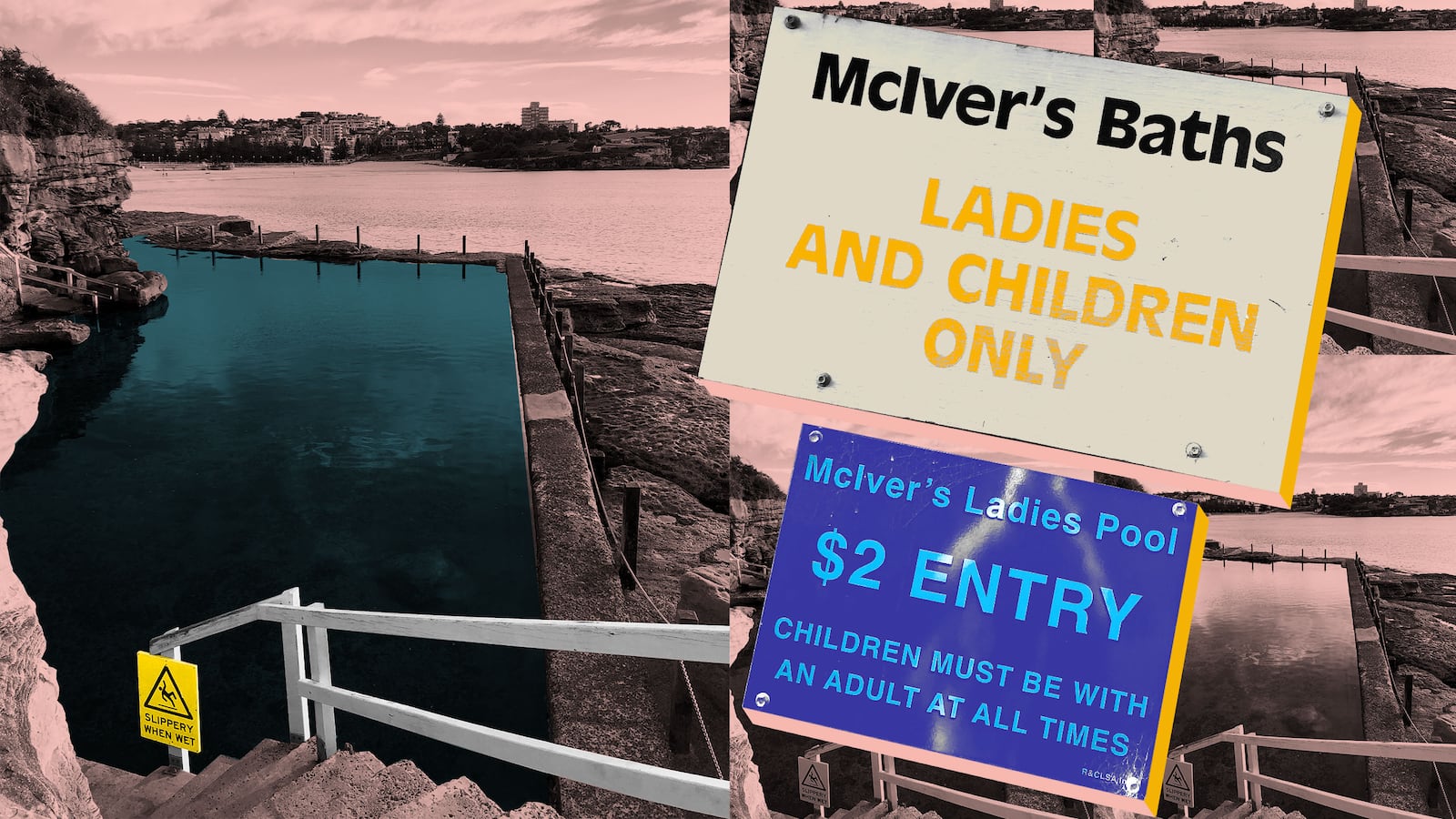The topless woman lingers briefly on the pool edge, then dives into the cool salt water. She surfaces next to a Muslim woman wearing a modesty swimsuit that covers her body from neck to ankle. Despite their differing states of dress, both are here for the same reason: the pleasure of swimming free from the male gaze.
McIver’s Ladies Baths is a women-only ocean pool in Sydney, Australia. Built into a rocky cove beneath the cliffs at the south end of Coogee Beach, three miles down the coastline from Bondi Beach, for more than a century it’s been a sanctuary for Sydney women. Every day from sunrise to sunset women of all ages come to swim and soak up the panoramic view. Some do disciplined laps in caps and goggles, some float idly on their backs, others sit in the shade of a tree to drink coffee and read to the sound of birds and crashing waves. It’s a blissful utopia, kind of like the all-women island Themyscira in Wonder Woman, minus the sword fighting practice.
McIver’s opened in 1886 (although the spot was used by indigenous Australian women long before) when conservative Victorian values dictated swimming should be gender-segregated. Back then, women were given only brief windows to use public pools, because #patriachy. Today, women can swim wherever we damn well please. But McIver’s is just as valuable now, albeit for a different reason. In the wake of the #MeToo movement, many women are seeking a reprieve from the threat of sexual harassment, and also the unequal power dynamic of being objectified or judged by a man. Most women are familiar with the mix of powerlessness, vulnerability, and fury felt when a man’s eyes follow her, sizing her up as she walks down the street. Feminist writer and film critic Laura Mulvey articulated it best in 1975: “In a world ordered by sexual imbalance, pleasure in looking has been split between active/male and passive/female. The determining male gaze projects its phantasy on to the female form which is styled accordingly … women are simultaneously looked at and displayed, with their appearance coded for strong visual and erotic impact so that they can be said to connote to-be-looked-at-ness.”
There is a noticeable feeling of relief in places that are patriarchy-free. Lying on the grass at McIver’s on a recent visit, breathing the fresh salt air into my lungs, I was struck not only by the aforementioned diversity—the pool is frequented by Muslim women, Catholic nuns and nudists, sometimes all at once—but the palpable sense of comfort and inhibition. Surgery scars, cellulite and faded tattoos were revealed unselfconsciously, flaws forgotten. The effect of thinking you’re not being observed.
“It's not that there wouldn't be erotic gazes—because women may look at other women—or bodily or cross-cultural comparisons,” says Associate Professor Ruth Barcan from the University of Sydney’s Department of Gender and Cultural Studies.
“But there is a collective belief that we will suspend them in this particular space.
“It may be especially noticeable [at McIver’s] because some beaches nearby, such as Bondi, have become very much about the gaze and the parading of bodies.”
Barcan compares the effect to that of nudist beaches (for some). Feeling you are not being judged, because of the unspoken or implied rules of a place, can make you feel less self-conscious, and then also become less critical of yourself and others.
“Acceptance of others and acceptance of self can go hand-in-hand,” Barcan says.
“[Body image] can be modified by collective and intersubjective experiences, especially repeated ones. Regular nudists experience a lessening of the critical self-evaluation that is … [the result of] the relentless gazes of the dominant culture.”
Jessica Vander Leahy knows. The 29-year-old writer, curvy model, and founder of Project WomanKIND, a platform empowering women to cultivate self-acceptance and healthy body image, is based in New York but visits McIver’s when in Sydney.
“There’s an inexplicable power and recharging energy that comes from being around women in a space where you don’t feel a masculine energy present,” she says.
“The idea that you can go somewhere and you don’t have to think about being sexualized by a stranger is so nice. It’s wonderfully freeing.”
Vander Leahy has heard the argument that women-only spaces like McIver’s or co-working venue The Wing contradict the notion of gender equality, but she disagrees.
“I know some people might say ‘Can you imagine if we made a beach men’s only? Feminists would be crying sexism!’ To that I say, this has been a man’s world for thousands of years. Note the context and history women are coming from, let us claim a f---ing rock on the side of a cliff to swim naked without feeling guilty about it.”
The pool’s women-only status has been challenged. In 1995 a man filed a complaint to Australia’s Anti-Discrimination Board, claiming it was unfair to men. He lost. The Ladies Baths was granted an exemption from the Anti-Discrimination Act indefinitely.
In the Court’s decision to maintain McIver’s as exclusively for women, it argued:
“For as long as women suffer unlawful discrimination, particularly by way of sexual harassment … they have a special need to a facility like McIver’s Baths.”
And harass, some do. A regular at the pool told me about instances where men have hidden in the bushes to watch them, or flown drones with cameras over the pool.
I saw for myself how essential McIver’s is last time I visited. I left and was walking along the Coogee promenade behind two women who had also been at the pool. A group of about five men in their late teens or early twenties began to harass them.
“Very sexy, ladies!” one called out, making a big deal of looking them up and down, his mouth hanging open. Another let out a wolf-whistle. The whole group laughed.
Back to reality.
Women and children under 12 are permitted at McIver’s. Entry to the pool, open from sunrise until sunset, is AUD $2 per person. There is no food, drinks or anything else available to buy inside. Visit the website for more information.





